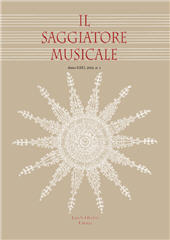La poetica della lontananza in 'Aida'
P. 69-104
The scenographic layout of Aida, as it appears from the captions and sketches of the sets for the Cairo (1871) and Milan (1872) performances, presents a systematic vastness and spatial multiplicity, combined with the presence of invisible environments directly involved in the musical action. Off-stage music has always been present in Verdi's theatre in isolated scenes, but in Aida it is repeated to the point of becoming a system, in close connection with the drama, as the consecration scene, the scene of Radamès' judgement and the finale. The essay sets out to investigate all the musical, dramatic, psychological and sentimental implications of the effect of distance, which does not exhaust its function in the physical and dramatic juxtaposition of visible and invisible settings but acquires symbolic significance. The voices of the priests and priestesses are in fact almost always placed offstage. Remoteness lends them a transcendent aura and represents the voice of destiny coming from afar.
But the poetics of remoteness can also be seen in the interiority of the characters and in the typically romantic feeling of deprivation that they share. Various dramatic and musical situations are thus analysed, together with the musical characterisation of the exoticism assumed by Verdi not as a decorative element but as an integral part of the dramatic project. At every level of expression, a dialogue is thus established between near and far, present and absent, reality and mystery, between those who hear what is happening offstage and those who, from within, do not hear those present on stage. The result is a pre-symbolist atmosphere that places Aida in the sphere of modernity and offers precise cues for the spectacular realisation of the score. [Publisher's text]
89693 characters
-
Artículos del mismo número (disponibles individualmente)
-
Información
Código DOI: 10.82026/11131
ISSN: 2035-6706


